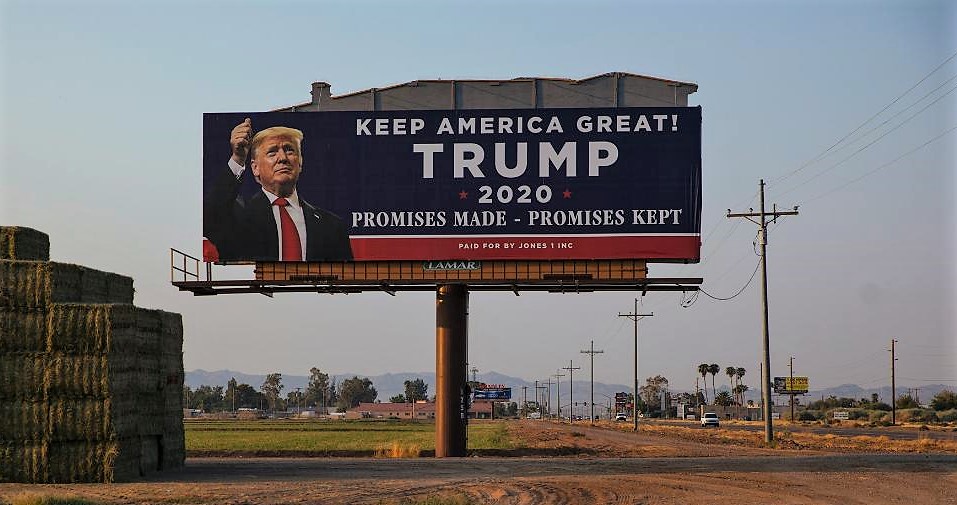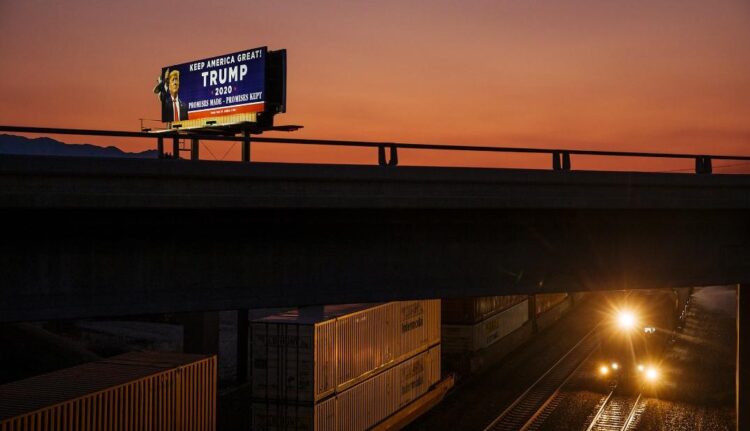A small gas station in California received small business bailout money from the Trump administration during the pandemic, then paid for Make America Great Again campaign billboards ahead the election.
Large, towering billboards attempting to rally support for Trump and his quest for a second term began showing up along a desert highway in early August.
Signs stamped with ‘Make America Great Again’ in capital letters or Trump looking wistfully at the sky with a thumbs up appeared along the California-Arizona border.
The small company that funded the sprawling billboards had months earlier received a significant cash loan from the same administration it is now championing.
Ethics and legal experts have said the move highlights the downfalls in the government’s Paycheck Protection Program (PPP).
Jones 1 Inc. was approved for a loan ranging between $150,000 and $350,000 on April 28 courtesy of the federal government’s PPP initiative, which was created to help small businesses pay staffers during the COVID-19 pandemic.
Four months later, the small company, which owns a Shell gas station and a travel center in Needles, California, would lease ‘six beautiful Trump billboards’ near the state’s border.
Six political billboards were estimated to cost anywhere from $10,000 to $30,000 for four weeks depending on the location.
Lamar Advertising, which leased the billboards to Jones 1 Inc., did not provide pricing for those specific billboards but the rate could skyrocket if they stay up through the election.
Lake Havasu Republicans, a conservative group in Arizona that inspired the billboards, said they plan to do just that as costs could potentially range from $30,000 to $120,000.
Joseph Jones, the owner of the small company, argued that the PPP money he received was used for employee payroll, not the billboards.
‘I simply wanted to support my president, that’s all there is to it,’ he said.
Whether or not the money Jones 1 Inc. received through the Small Business Administration loan program was directly used to pay for the Trump billboards, business ethics professors and legal experts said non-essential spending like this violates the spirit of the program, which was meant for small businesses that desperately needed the assistance to keep paying workers.
More importantly, they said, this spending highlights failures in how the program was implemented and the confusion surrounding which businesses should have been entitled to the money.
It also underscores the need for increased oversight — especially when the government decides which loans to forgive outright.
“If you have enough capital to spend it on billboards, maybe you shouldn’t have been one of the companies to receive this loan,” said Liz Hempowicz, director of public policy at the Project On Government Oversight (POGO), a nonprofit watchdog group. “The responsibility really rested with the SBA and the administration to make sure they were spending these taxpayer dollars in a way that Congress intended.”
Linda Ferrell, a business ethics professor at Auburn University, said companies receiving taxpayer-subsidized funds should have a “social responsibility” to use the money to protect their employees and customers.
But like Hempowicz, she said she holds the government more responsible than any one business owner, especially given the uncertainty at the beginning of the pandemic that may have led some business owners to apply for the loans in good faith, before ending up in better financial shape than expected.
The idea for the billboards began with members of the Lake Havasu Republicans Facebook group, creator Gianna Kraft said.
Jones, she said, was the member who volunteered to make the vision a reality.
‘I’m getting daily pictures, people taking selfies showing their support, people driving by and saying they’re awesome and what a great impact they are having,’ said Kraft.
Mohave County, Arizona, was one of the top Trump voting counties in the nation in 2016.
Lake Havasu is also planning a boat parade to pay tribute to Trump over Labor Day weekend.
The PPP program, which launched in April through Congress, was initially criticized after massive publicly-traded companies like Shake Shack and the operator of Ruth’s Chris Steakhouse had gotten millions in bailout loans.
Those two companies eventually returned the money, but not before the program was accused of favoring big businesses.
The Small Business Administration and Treasury Department released guidelines around that time reiterating that all borrowers must apply ‘in good faith’ that their operations needed the money to stay open.
Businesses that falsely self-certified their needs and refused to return the money could face civil and criminal punishments.
PPP funds were loaned with an interest rate of one per cent, much lower than usual private sector loans and will be completely forgiven if the business proved ‘payroll costs, interest on mortgages, rent, and utilities’ and ‘at least 60% of the forgiven amount must have been used for payroll.’
‘I don’t know if it matters if it was the PPP loan money or other money that was freed up by the PPP loan,’ Hempowicz said about the billboard funds.
Jones 1 Inc. is ‘still benefiting from a hilariously low interest rate that wasn’t necessarily designed to allow small business owners to buy a bunch of billboards,’ she added.
As of August, more than $250 billion in loans was approved through the federal program despite several business owners complaining early into the pandemic that they could not secure one.
Jones would not provide details about what led him to apply for the loan, how his financial situation fared, if he has plans to return the money or apply for the loan to be forgiven.
The Small Business Administration declined to comment on Jones 1 Inc. specifically, but said a bank’s approval of a PPP loan doesn’t mean the company is eligible for the loan and although loans of more than $2million were automatically reviewed, all PPP loans can be reviewed at any time.
It’s far from uncommon for businesses to publicly engage in politics through donations or other means.
There is no cap on independent spending that is not directly tied to political campaigns, but there are rules for ‘independent expenditures.’
Spending more than $1,000 must be reported to the Federal Election Commission within 24 hours.
The billboards funded by Jones 1 Inc. do state they were paid independently by the company, but lack the required disclaimer that they are not authorized by a political candidate.
FEC records show Jones has not reported the spending yet.
Businesses that primarily take part in political activities are barred from receiving Small Business Administration loans under federal law, but that would not apply to a small company like a gas station that engaged in political spending.
The Trump administration initially fought to keep details about which businesses benefited from the assistance program a secret, but some data was released after pressure from lawmakers and media organizations sued.
Professor of business ethics at Santa Clara University, Michael Santoro, noted the obvious conflict of interest between Jones 1 Inc. and the federal loan.
He then pointed to the Small Business Association and questioned if they will investigate.
‘Clearly something looks really, really wrong so that’s the SBA’s job to look into,’ said Santoro.

